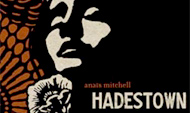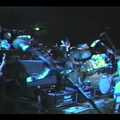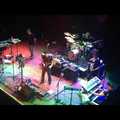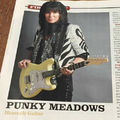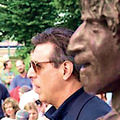
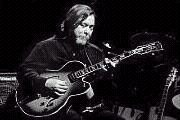 GyK: How was it decided who will play with Frank in the concert?
GyK: How was it decided who will play with Frank in the concert?
BABOS: We (Egri, Kőszegi, Szakcsi and I) formed a jazz band that was really accustomed together. We had used to play jazz in Merlin Theatre around that time, and the organizator of Zappa's concert was the same person as of the Merlin concerts. When Zappa called him, he said he didn't care about anyone from the hungarian jazz or rock scene, he was only interested in those musicians of gipsy origins who were the "product" of those weird communist decades. So that was his decision.
LM: Once I read an interview with Zappa in which he said he was to create a world music band in which one player was to be invited from all countries of the world to play a very special instrument that is characteristic to his or her nation; and he planned to involve gipsy musicians, too.
BABOS: If you just think about it, what is really a hungarian invention of our musical life? Classical music is a completely international genre, jazz is also imported - like basketball, you know; it is hungarian because it is played by us. The authentic gipsy music is just getting to widespread now that the audience wishes to hear some more sophisticated things, but since the times of Franz Liszt Hungary has gained respect by the gipsy music of the cafés, by that special way those guys play.
LM: How did the cooperation finally get started?
BABOS: Well, the phone rang one day, "hey kids, Frank Zappa has just arrived, you should be at the Tabán (the quartier of Budapest where the concert took part) by 3 o'clock p.m. with your instruments". So we arrived there at 3 o'clock, a limousin came along, Frank Zappa came up to the scene, and asked us if we had some cigarettes. We said yes. So we smoked, and the guys from the city headquarter were there wondering "god, what Frank Zappa will say"? Well, Frank Zappa said to fetch two pieces of 9V batteries because those in his guitar were exhausted. Those days I think he had some 43 guitars, and he hadn't played for years at all. To Budapest he brought a very special one. He took the guitar, put in the batteries and simply started to play; and we kept listening. In jazz you always have a leader to watch out. He started to lead the session, and we followed.
LM: So you had a discussion before that...
BABOS: Oh no, we didn't discuss anything!
LM: Anything at all?
BABOS: No, nothing
LM: Hm, I was just to ask about what the common things are to keep watching in those situations...
 BABOS: There weren't any. You should just keep playing and the ideas come along. Like in Kex (hungarian avant-garde rock band of the early seventies) or with György Szabados (hungarian free-jazz pianist). Playing impovised music that's the way that things go on. Ideas came and went by, sometimes Frank showed us who was to play the next solo. Then something happened that was unique in music, though. We played in 3/4, then suddenly Zappa showed Imre (the drummer) "five" by his hand. It meant he wanted to change to 5/4. Normally a band should practice for two hours to be able to make this change. In this case that guy had such an aura, such a charisma, like in soccer matches, when all balls just go where they are due to, that we were just cool, kept playing, 4-3-2-1... and we changed to 5/4 without having taken notice of it. Without any difficulty.
BABOS: There weren't any. You should just keep playing and the ideas come along. Like in Kex (hungarian avant-garde rock band of the early seventies) or with György Szabados (hungarian free-jazz pianist). Playing impovised music that's the way that things go on. Ideas came and went by, sometimes Frank showed us who was to play the next solo. Then something happened that was unique in music, though. We played in 3/4, then suddenly Zappa showed Imre (the drummer) "five" by his hand. It meant he wanted to change to 5/4. Normally a band should practice for two hours to be able to make this change. In this case that guy had such an aura, such a charisma, like in soccer matches, when all balls just go where they are due to, that we were just cool, kept playing, 4-3-2-1... and we changed to 5/4 without having taken notice of it. Without any difficulty.
So that was the rehearsal. In the afternoon we had a short conversation, jammed a little, then he was taken away to be hauled here and there. In the evening he was back. He didn't really like all that ado with limousin, bodyguards, he even made signs to show us how he disliked it. In the afternoon he put the improvisative skills of the musicians to a test, tried if this kind of meta-communication could work; and in the evening, when he had completely different things in his mind, when all had a different feeling, and he knew he had some good musicians around him, he played a completely different thing. His charisma and his faith in music was so strong, so deep, that each of those tens of thousands of people could feel it.
LM: What was your impression about Zappa as a man during the conversations you had?
BABOS: We couldn't really have a good chat here, 'cause all those people around him were sitting on him like birds on the wire. Everyone just wanted to be with Frank Zappa. He said he wanted to spend some time with the musicians, but he couldn't - due to protocol matters. He said that after the show we'll come together, hang around, have some chat, 'cause it's him, Prince, Sting and Pat Metheny are those four musicians who, anywhere they go, at night, right after the concert, go and visit the local clubs, to play with local musicians 'til morning. That's what he wanted to do here, too, but he was forced to give it up. They couldn't force Par Metheny, when he was here: he came along to jam with us until 6 a.m. Anyway, let's get back to Zappa: in those days I was just working on my album called "Blue Vicrory" with american session musicians so I went to the States two weeks later. Terri Lynn Carrington, the marvellous afro-american girl, who is one of the most busy drummers in the world these days, invited me to visit her new flat. I was with her when the phone rang, and they said that it's Frank Zappa on the line. He invited me to come down for diner to their place. He was really kind. Carrington, who had toured the whole world, asked me who was it. I told her it was Frank Zappa. To this she replied "please, bring me with you in your pocket"' Such a respect had Zappa for the american musicians. The next day I spoke with Gail who told me about the tough, dirty american music lawyers, one must watch out! So she teached me how to make a contract. I was to meet the Zappas on Friday. It was Friday morning that Gail called me that they must cancel the evening program because Frank went so bad.
 LM: Was his illness detected by that time
LM: Was his illness detected by that time
BABOS: No, it wasn't; she just told me that Frank wasn't well, let's change the date. Finally we couldn't find another one. Then I left the States, so practically all the time we had together are those thirty-fourty minutes on two occasions when we had the rehearsal and the concert in Budapest. And the phone call.
LM: Still the concert was a special experience for you?
BABOS: Sure. Just imagine that you grow up in Hungary, making music, and all of a sudden you are playing with all those idols whom you were given the strength by to be able to do it. You, from Népszínház street, turn out to be not worse a partner at all than anyone else in the whole world.
GyK: How did you personally meet the music of Frank Zappa?
BABOS: I heard Captain Beefheart and Frank Zappa at about 1967-68 for the first time. But the real Frank Zappa-fun was mr. Jackie Orszáczky (a legendary, hungarian-born jazz-rock musician and producer, now living in Australia), I only knew that he had made me to hear. I think the most significant was the 200 Motels soundtrack. I can't really tell you titles of songs or albums, on some reason it is just blocked in my mind. It's more the smell and the taste of those things that remained. The real magic about this guy is when he plays two - otherwise well-known - notes, and there you are touched by the heart. And playing together... Maybe it's a weird allusion, but it's like playing basketball with Magic Johnson.
GyK: Here are two more questions. First, what was the most interesting about Zappa's way of playing the guitar? The second, what was the most difficult thing when playing together?
BABOS: About playing the guitar, or simply playing music, the most interesting thing is when someone plays some tunes, and if he is doing well, he can open new worlds for you. Frank Zappa could open universes by just one musical note. He had credit just by playing the simplest things.
GyK: It was him who wrote that the problem about his own guitar work was that he just didn't follow the rythmic section, he had to find the musicians who can follow him. In the Tabán concert it didn't seem to be a problem: the five musicians were playing together as if they had had a long time of practice together.
BABOS: That was the point. Sometimes two musicians can't find out each other's ideas. In that case it worked.
LM: The meta-communication worked.
BABOS: That's it. I used to describe this phenomenon as it happens in soccer that someone just kicks the ball in an indifferent direction, and someone just come and scores it precisely. He was like a transmitter that broadcasts extremely well. Everyone was just connected to him. Otherwise it's like in jazz, one must always communicate with the others. It was a huge honour for me to play with him.
GyK: You used to play solos, and here in the Tabán you had to play with another soloist, what's more, with someone who plays solos on the same instrument as yours. How to cooperate is such a case?
BABOS: Had I been a Frank Zappa-copy it would have been a weird situation: there you are right behind the original one. But since my childhood, as an influence of Gábor Szabó, I wanted to play in my own way: not as good as Béla Radics (hungarian rock guitar hero), as George Benson or as Pat Metheny; just as good as I can play. Until I am able to accomplish this, I am not afraid of going up to stage even after the best guitarist in the whole world.
english translation: Ungawwa

2005, July 3 - 14:58.





